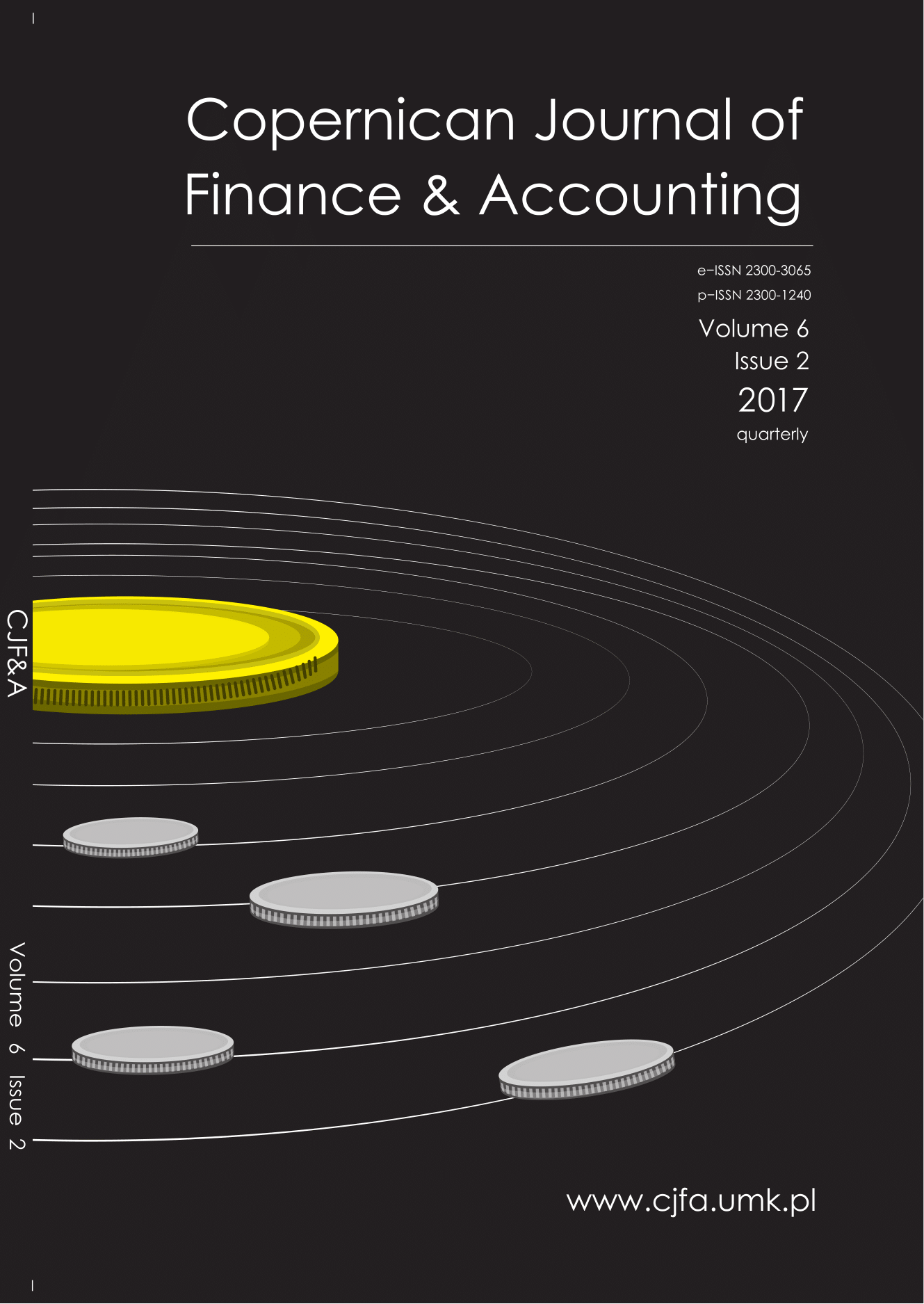CREATIVE ACCOUNTING PRACTICIES IN SLOVAKIA AFTER PASSING FINANCIAL CRISIS
DOI:
https://doi.org/10.12775/CJFA.2017.012Keywords
accounting ethics, creative accounting, earnings management, GAAP, IFRS, financial reportingAbstract
Fraud in economics and accounting is the practice which is adopted within the framework of accounting system or in other words taking undue advantage of loopholes of accounting system is creative accounting. In highly competitive market, it becomes very important and necessary for every business to find new and innovative ways of running the business. And one of the new ways is creative accounting. Creative accounting is an art of manipulating the books of accounts in a manner that desired results can be drawn. Aggressive accounting, cooking the books and massaging the numbers are few common terms used in context of creative accounting. Creative accounting in present uncertain environment is facilitating management to accomplish personal goals as big, well established firms followed.References
Beidleman, C.R. (1973). Income smoothing: the role of management. The Accounting Review, 48(10), 653–667, https://www.jstor.org/stable/245289?seq=1#page_ scan_tab_contents (accessed: 25.05.2017).
Breton, G., & Taffler, R.J. (1995). Creative accounting and investment analyst response. Accounting and Business Research, 25(9), 81–92, http://www.econjournals.com/ index.php/ijefi/article/viewFile/1047/pdf (accessed: 23.05.2017).
Burgstahler, D., & Eames, M. (1998). Management of earnings and analysts’ forecasts to achieve zero and small positive earnings surprises. University of Washington, working paper, http://onlinelibrary.wiley.com/doi/10.1111/j.1468-5957.2006.00630.x/ abstract (accessed: 25.05.2017).
Conner, I.E. (1986). Enhancing public confidence in the accounting profession. Journal of Accountancy, 12(7), 76–83.
Dechow, P.M., & Skinner, D.J. (2000). Earnings management: Reconciling the views of accounting academics, practitioners and regulators. Accounting Horizons, 14 (2), 235–251, https://papers.ssrn.com/sol3/papers.cfm?abstract_id=218959 (accessed: 27.05.2017). http://dx.doi.org/10.2139/ssrn.218959.
Dharan, B., & Lev, B. (1993). The valuation consequence of accounting changes: a multi-year examination. Journal of Accounting Auditing and Finance, 8 (4), 475–494, http://baladharan.com/files/dharan-lev-accounting_changes-JAAF_2003.pdf (accessed: 25.05.2017). http://dx.doi.org/10.1177/0148558X9300800407.
Fischer, M., & Rosenzweig. K. (1995). Attitudes of students and accounting practitioners concerning the ethical acceptability of earning management. Journal of Business Ethics, 14 (2), 433–444, https://link.springer.com/article/10.1007/BF00872085 (accessed: 25.05.2017). http://dx.doi.org/10.1007/bf00872085.
Fox, J. (1997). Learn to play the Earnings Game. Fortune, 1997-07-31, 5–8, http://archive.fortune.com/magazines/fortune/fortune_archive/1997/03/31/224039/index.htm (accessed: 21.04.2017).
Healy, P.M. (1985). The effect of bonus schemes on accounting decisions. Journal of Accounting and Economics, 7(3), 85–107. http://dx.doi.org/10.2308/acch.1999. 13.4.3651.
Healy, P.M., & Wahlen, J.M. (1999). A review of the earnings management literature and its implications for standard setting. Accounting Horizons, 13(4), 67–77. https://doi. org/10.1016/0165-4101(85)90029-1 (accessed: 25.05.2017).
Hepworth, S.R. (1953). Smoothing periodic income. The Accounting Review, 15(1), 32–39, https://www.jstor.org/stable/241436?seq=1#page_scan_tab_contents (accessed: 23.05.2017).
Hermann, D., & Inoue, T. (1996). Income smoothing and incentives by operating condition: an empirical test using depreciation changes in Japan. Journal of International Accounting Auditing and Taxation, 5(2), 161–178. https://doi.org/10.1016/S10619518(96)90003-8 (accessed: 25.05.2017).
Iceberg research report (2015). Revealing financial manipulation and accounting frauds, https://iceberg-research.com/ (accessed: 20.10.2015).
Kamin, J.Y., & Ronen, J. (1978). The smoothing of income numbers: some empirical evidence on systematic differences among management – controlled and owner – controlled firms. Accounting, Organizations and Society, 3(2), 141–157. https://doi. org/10.1016/0361-3682(78)90022-3 (accessed: 27.05.2017).
Mc Nichols, M., & Wilson, G. P. (1988). Evidence of Earnings Management from the Provision for Bad Debts. Journal of Accounting Research, 26(1), 1–31, https://www.jstor.org/stable/2491176?seq=1#page_scan_tab_contents (accessed: 23.05.2017).
Merchant, K.A. (1990). The effects of financial controls on data manipulation and management myopia. Accounting, Organizations and Society, 15(4), 297–313. https:// doi.org/10.1016/0361-3682(90)90021-L (accessed: 25.05.2017).
Merchant, K.A., & Rockness, J. (1994). The ethics of managing earnings: an empirical investigation. Journal of Accounting and Public Policy, 13(1), 79–94. https://doi. org/10.1016/0278-4254(94)90013-2 (accessed: 23.05.2017).
Niskanen, J., & Keloharju, M. (2000). Earning cosmetics in a tax-driven accounting environment: evidence from Finnish public firms. The European Accounting Review, 9(3), 443–452. http://dx.doi.org/10.1080/09638180020017159 (accessed: 25.05.2017).
Revsine, L. (1991). The selective financial misrepresentation hypothesis. Accounting Horizons, 12(1), 16–27, https://blablawriting.com/the-selective-financial-misrepresentation-hypothesis-by-lawrence-revsine-essay (accessed: 21.04.2017).
Ruland, R.G. (1984). Duty, obligation and responsibility in accounting policy making. Journal of Accounting and Public Policy, 14(3), 223–237. https://doi. org/10.1016/0278-4254(84)90018-8 (accessed: 28.02.2017).
Schilit, H.M. (1997). Is it fraud or just slick accounting? CEO Magazine, 8-1997, 7–9.
Schipper, K. (1989). Commentary on earnings management. Accounting horizons. 12(2), 91–102.
Skoda, M. & Hrazdilova Bockova, K. (2014). Study of culture of project oriented society. International Journal of Information Technology and Business management, 29(2), 167–180, http://www.jitbm.com/JITBM%2029th%20volume/2%20project%20 culture.pdf (accessed: 14.03.2017).
Sweeney, A.M. (1994). Debt-covenant violations and managers’ accounting responses. Journal of Accounting and Economics, 17(4), 281–308. https://doi. org/10.1016/0165-4101(94)90030-2 (accessed: 25.05.2017).
Taffler, R., & Breton, G. (2001). Accounting Information and Analyst Stock Recommendation Decisions: A Content Analysis Approach. Accounting and Business Research. 31(2), 91–101. http://dx.doi.org/10.1080/00014788.2001.9729604 (accessed: 27.05.2017).
Trueman, B., & Titman, S. (1988). The explanation for accounting income smoothing. Journal of Accounting Research, 26(3), 127–139, https://www.jstor.org/ stable/2491184?seq=1#page_scan_tab_contents (accessed: 01.06.2017).
Downloads
Published
How to Cite
Issue
Section
Stats
Number of views and downloads: 632
Number of citations: 0



